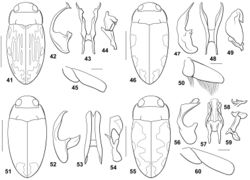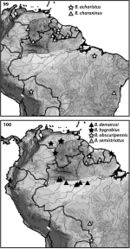Bidessodes hygrobius
| Notice: | This page is derived from the original publication listed below, whose author(s) should always be credited. Further contributors may edit and improve the content of this page and, consequently, need to be credited as well (see page history). Any assessment of factual correctness requires a careful review of the original article as well as of subsequent contributions.
If you are uncertain whether your planned contribution is correct or not, we suggest that you use the associated discussion page instead of editing the page directly. This page should be cited as follows (rationale):
Citation formats to copy and paste
BibTeX: @article{Miller2017ZooKeys, RIS/ Endnote: TY - JOUR Wikipedia/ Citizendium: <ref name="Miller2017ZooKeys">{{Citation See also the citation download page at the journal. |
Ordo: ORDO
Familia: FAMILIA
Genus: Bidessodes
Name
Bidessodes hygrobius Young, 1986 – Wikispecies link – Pensoft Profile
- Bidessodes (Bidessodes) hygrobius Young, 1986: 216; Biström, 1988: 7; Nilsson, 2016: 98.
Diagnosis
This species does not have a carinate prosternum in either male or female. The prosternal process is longitudinally approximately flat, the lateral margins are subparallel, the apex is pointed. The male mesotibia and the male metafemur and metatrochanter are not noticeably modified (Fig. 60). The male abdominal ventrite VI is unmodified. The male median lobe is robust in lateral aspect, abruptly curved, apically pointed with a distinct ventral expanded angulation and a subapical projecting lobe with the apex elongate pointed (Fig. 56). In ventral aspect it is similarly robust with sinuate lateral margins (Fig. 57). The basal segment of the lateral lobe is small and irregular (Fig. 58). The apical segment is extremely irregular with a prominent transverse apical lobe which is hooked on the ventral apex (Fig. 59). Specimens are robust with maculate elytra (Fig. 55).
Distribution
Known from lowland Venezuela and French Guiana (Fig. 100).
Taxon Treatment
- Miller, K; 2017: A review of the Neotropical genus Bidessodes Régimbart, 1895 including description of four new species (Coleoptera, Adephaga, Dytiscidae, Hydroporinae, Bidessini) ZooKeys, (658): 9-38. doi
Images
|

